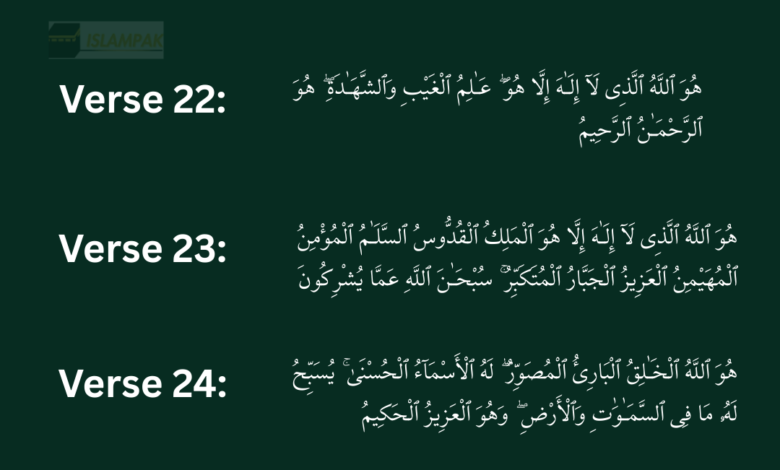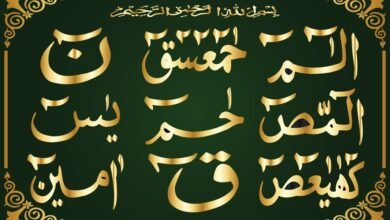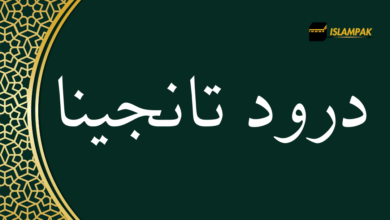Last 3 Ayat of Surah Al-Hashr: Translation, Virtues & Benefits
Last 3 Ayat of Surah Al Hashr: Translation & Benefits

Assalamu Alaikum wa Rahmatullahi wa Barakatuh, dear brothers and sisters. Today, let us reflect on a treasure from the Qur’an that holds immense blessings: the last three verses of Surah Al Hashr. As a humble student of knowledge, I wish to share with you their translation, significance, and the profound benefits mentioned by our beloved Prophet Muhammad (peace be upon him) and the scholars.
What Are the Last 3 Verses of Sura-al-Hashr?
These verses, from Ayah 22 to 24, are a majestic description of Allah’s beautiful names and attributes. They read as follows:
Ayah 22:
He is Allah-there is no god but He, Knower of the unseen and the seen; He is the Most Merciful, the Most Compassionate.
Ayah 23:
He is Allah-there is no god but He, the Sovereign, the Holy, the Source of Peace, the Granter of Security, the Watcher, the Mighty, the Compeller, the Supreme. Glory be to Allah above what they associate with Him.
Ayah 24:
He is Allah, the Creator, the Maker, the Shaper. To Him belong the most beautiful names. Whatever is in the heavens and the earth glorifies Him. He is the Mighty, the Wise.
Why Are These Surah Verses So Special?
My dear friends, these ayat are not just a recitation-they are a declaration of our faith and a source of spiritual power. They remind us of Allah’s absolute sovereignty, His mercy, and His closeness to us in every moment.
-
Affirmation of Tawheed:
These verses emphasize that Allah alone is worthy of worship, and He is free from all imperfections. -
Reflection on Allah’s Names:
In these three verses, more than a dozen of Allah’s beautiful names are mentioned. Reciting them is a form of dhikr (remembrance), drawing us nearer to our Lord. -
A Source of Strength:
When life’s hardships weigh upon us, these verses remind us that Allah is the Protector, the All-Knowing, and the Most Merciful. No matter how alone we feel, Allah is always with us.
Benefits of Reciting the Last 3 Ayat of Surah Al Hashr
Let us look at what our beloved Prophet ﷺ said about these verses:
“Whoever recites in the morning: ‘A’udhu billahis Sami’il ‘Alim minash shaytanir rajim’ and then recites the last three verses of Surah Hashr, Allah appoints 70,000 angels to pray for him until the evening. If he dies on that day, he dies as a martyr. The same applies if he recites them in the evening.”
(Sunan Tirmidhi, Hadith: 2922)
Other reported benefits of Hashr Surah include
-
Protection from calamities, evil eye, jinn, and shayateen2.
-
Increase in sustenance and blessings.
-
Forgiveness of sins and acceptance of prayers.
-
Guidance to the straight path.
-
Peace of mind and tranquility-knowing Allah is always near24.
How to Incorporate These Al Hashr Verses Into Your Daily Life
-
Recite these verses after Fajr and Maghrib, as recommended in Hadith.
-
Reflect on the meanings and try to memorize the beautiful names of Allah mentioned.
-
Teach your family and children, so that the blessings may continue in your home.
A Final Advice from the Heart
Dear brothers and sisters, the Qur’an is a healing and a mercy. The last three ayat of Surah Al Hashr are a shield, a source of light, and a means of earning Allah’s special mercy. Make it a habit to recite them daily, and you will witness the transformation in your life-your heart will find peace, your worries will lessen, and your connection with Allah will deepen.
May Allah grant us the ability to act upon His words and make us among those who remember Him abundantly. Ameen.
Frequently Asked Questions
Can I recite these verses at any time?
Yes, but the greatest reward is mentioned for reciting them after Fajr and Maghrib.
Are these verses a protection against evil?
Yes, they are a means of protection from harm, as mentioned in authentic Hadith2.
Do these verses mention Allah’s names?
Yes, more than fifteen beautiful names of Allah are mentioned, making them a powerful form of dhikr3.
May Allah accept from all of us. Jazakumullahu khairan for reading.
Written with love and care, inspired by the style of our respected scholars and elders.


